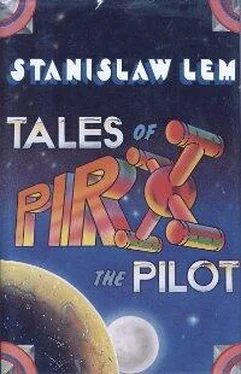Logically the accident must have struck around dawn. For if not for the radio blackout, the man on duty at the station could have communicated, without having left the kitchen, with the one outside. Haste must also have been a factor, since only when the outer hatch was left unsealed did the mechanical failure manifest itself. Too, the person bent on saving time was more apt to lose time through his haste—by dropping a packet of plates, by upsetting the plate rack… Too, a radar blip is indistinct enough for a metal marker located 2,000 meters away to be mistaken for a man’s space suit. The convergence of all these factors made such a tragedy not only possible but probable. Finally, the man on duty must have been in the kitchen, or somewhere else, but in any case not in the radio station, where he would have seen that his partner was correctly oriented, and would not have taken the blip in the southern perimeter for a space suit.
It was no coincidence that Challiers’s body was found within a close radius of the spot where Roget had perished. He fell and landed directly below the site posted with the aluminum marker, deliberately placed there as a warning. Challiers was obviously steered in that direction by the radar input.
The technical cause was simple and straightforward—to the point of being trivial. All it required was a series of coincidences and the presence of such factors as radio interference and an open pressure-chamber hatch.
More noteworthy were the psychological factors. When the monitoring device, in the absence of any input, displayed the internal voltage oscillation as a “breathing,” pulsating butter-fly, and when the radar screen projected a space-suit-like image, both men, first Savage and then Challiers, had been quick to accept these as reliable visual presentations, each believing the other to be in mortal danger. The same held true for Pirx and Langner.
Such responses were only natural for men intimately acquainted with the details of Roget’s death, of that long and agonizing ordeal luridly and dramatically transmitted on the “magic eye.”
If, then, as was purported, it was simply a case of a “conditioned reflex,” then it was manifested not by the hardware but by humans. Half-unconsciously, each of them, Pirx and Langner, had been aware of a possible repetition of Roget’s fate, this time with one of themselves as the victim. “Now that we know all the circumstances,” said Professor Taurov, a cyberneticist from the Tsiolkovsky team, “tell us, Pirx—what tipped you off? You said yourself you didn’t understand the cause-and-effect mechanism…”
“I don’t know,” said Pirx. The blinding white of the sun-glazed peaks throbbed through the window. Their needle tips—like baked bones—pierced the thick black firmament. “The plates, I guess. As soon as I saw them, I realized I had done exactly what Challiers had done with them—dumped them on the table. The plates—well, okay, that could have been a coincidence. But we were having omelets for supper—the same thing they were having that night. That was one too many; it had to be more than just a fluke, I figured. Yep, the omelets are what saved us…”
“Yes,” said Professor Taurov. “The open hatch was indeed a function of the omelets—or, more accurately, of your haste to make it back in time for supper. There your perceptions were quite apt. But,” he added, “they would not have saved you if you had trusted blindly in the monitors.” He paused. “On the one hand, we have no choice but to trust in our technology. Without it we would never have set foot on the Moon. But… sometimes we have to pay a high price for that trust.”
“That’s true,” said Langner, rising up from his chair. “But, gentlemen, I must tell you what impressed me most about my cosmic colleague. As for me, that little stroll down the cliff… well, it fairly ruined my appetite. But this one”—he placed his hand on Pirx’s shoulder—“after all that happened, he polished off I don’t know how many omelets. Amazing! I mean, I always thought of him as a decent, regular sort of fellow…”
“Huh?!” said Pirx.











